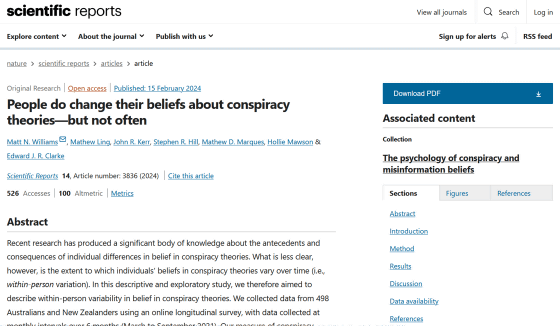Research shows that conspiracy theorists can change their minds over time

There are a wide variety of conspiracy theories in the world, such as ``Global warming is not actually happening,'' ``The September 11 terrorist attacks in the United States (9/11) were the government's own production,'' and ``The new coronavirus vaccine is part of a population reduction plan.'' . Many people may think that it would be difficult for conspiracy theorists to change their beliefs, but a study that tracked people's thoughts on conspiracy theories over a six-month period found that ``Although a small percentage of conspiracy theorists change their beliefs, The results showed that it is possible to change.
People do change their beliefs about conspiracy theories—but not often | Scientific Reports

Out of the rabbit hole: new research shows people can change their minds about conspiracy theories
https://theconversation.com/out-of-the-rabbit-hole-new-research-shows-people-can-change-their-minds-about-conspiracy-theories-222507
Many conspiracy theories lack solid evidence to support them, but they still attract many believers. For example, past research has shown that about 7% of New Zealanders and Australians believe in the chemtrail conspiracy theory that contrails that remain long after a plane has taken off are a hazardous substance that is kept secret from the public. I understand that. Some people believe in chemtrails, even though the scientific community has completely rejected this theory.
Conspiracy theories regarding vaccines for the new coronavirus infection (COVID-19) have become a social issue, and research on conspiracy theories has been rapidly progressing in recent years. Among them, ` `People with lower critical thinking abilities are more likely to believe in conspiracy theories,'' and `` People who have become anti-vaccines since the coronavirus pandemic may be more inclined to conspiracy theories and spirituality.'' However, it is not well understood how often people change their beliefs once they believe in a conspiracy theory.
A research team led by Matthew Williams , a senior lecturer in psychology at Massey University in New Zealand, recruited a total of 498 Australians and New Zealanders and conducted a six-month survey asking them about their beliefs in conspiracy theories. Did.

The research team recruited subjects online and asked them how much they agreed with a total of 10 conspiracy theories. All of the conspiracy theories presented by the research team appeared in the 2000s and were related to issues in modern society such as 5G communication technology and COVID-19.
As a result of the survey, each conspiracy theory had its own believers, but the percentage of believers varied, and the majority of people did not agree with either conspiracy theory. In the first survey, the statement with the most support was ``Pharmaceutical companies covered up cancer treatments to protect their own profits,'' with about 18% agreeing, but ``COVID-19 vaccine Only 2% of respondents agreed with the conspiracy theory that 'contains microchips to monitor and control people.'
In addition, the follow-up survey was conducted at a time when antipathy towards the government was increasing due to the COVID-19 pandemic and the resulting lockdown, but despite six months of follow-up, ``the number of people who believe in conspiracy theories has increased.'' There was no tendency to say 'I did.'
The graphs below, starting from the top left, are: ``Pharmaceutical companies hid cancer treatments to protect their own profits'' and ``A powerful and secretive group called

In the long run, the ratio of people who believe in conspiracy theories and people who do not believe in conspiracy theories does not change, which means that for every conspiracy theory, there is a small percentage of people who abandon the conspiracy theory they initially believed. There will be people who did not believe in the conspiracy theory at first, but who gradually came to believe it. This shows that people's beliefs and disbelief in conspiracy theories are not static.
``People are clearly deciding to reject conspiracy theories that they previously believed,'' Williams and colleagues said, arguing that once you get hooked on a conspiracy theory, it's not impossible to get out. .
Related Posts:
in Science, Posted by log1h_ik







